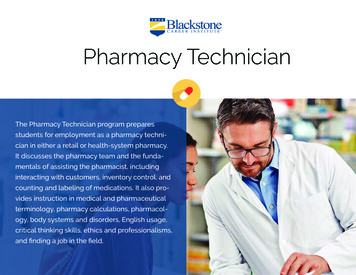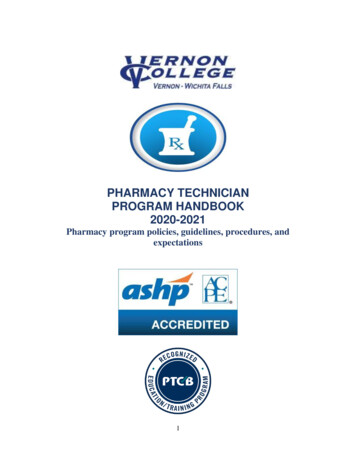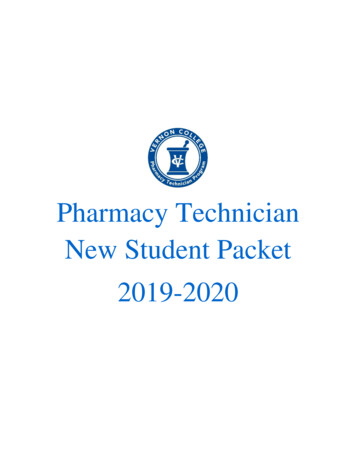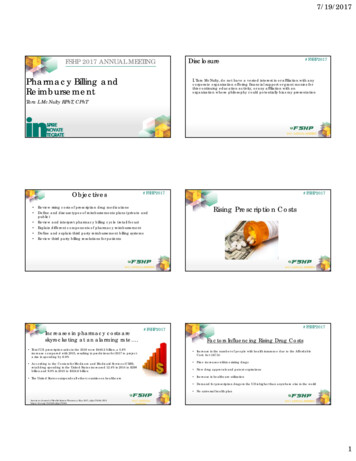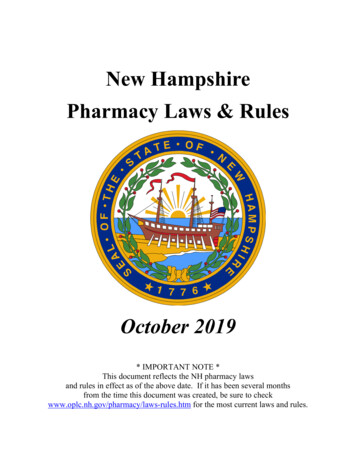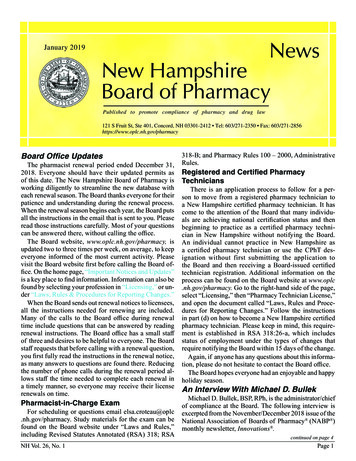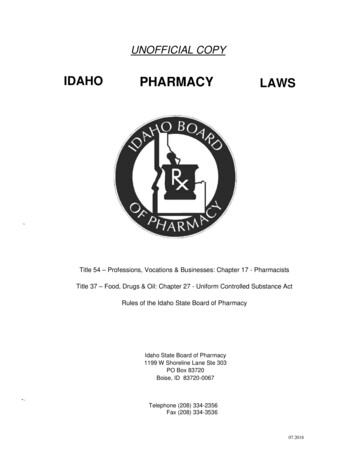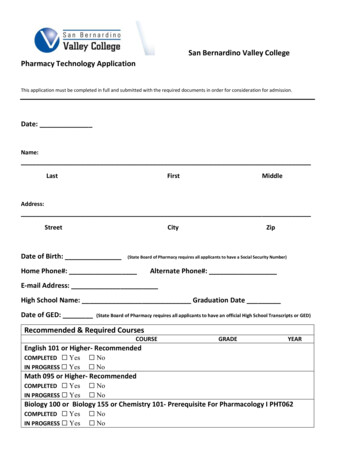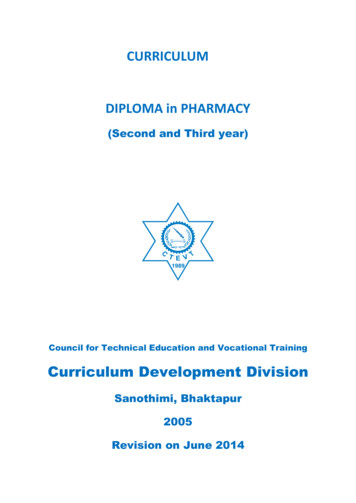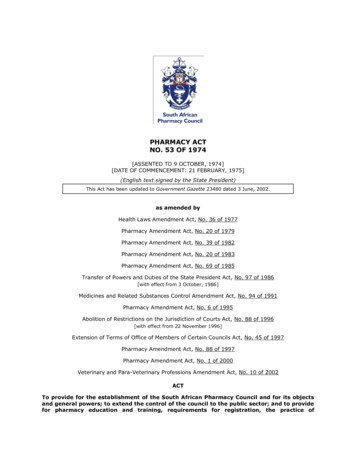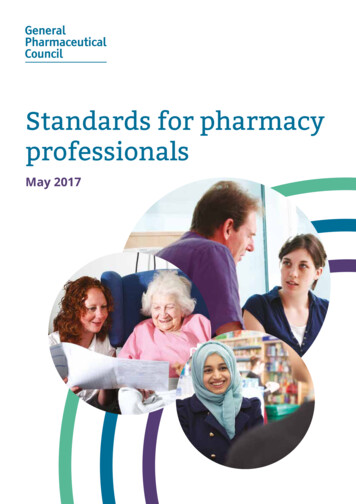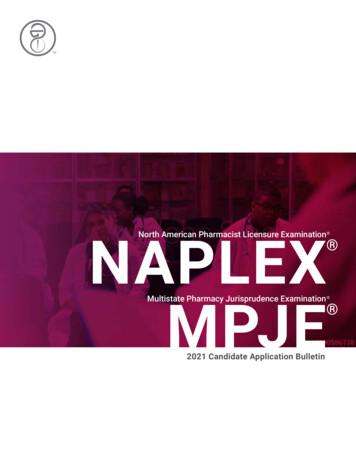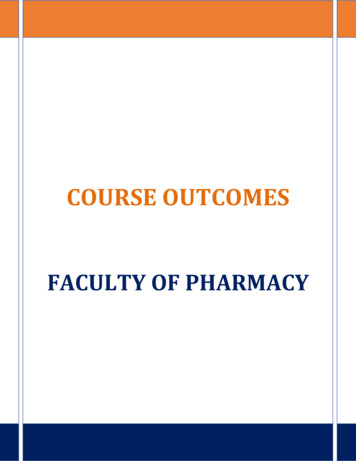
Transcription
COURSE OUTCOMESFACULTY OF PHARMACY
Course Outcomes - B.PharmSl. No.Name of theProgram1Name of the CourseCourse OutcomeHuman anatomy andPhysiology-I1. Students would have studiedabout the gross morphology,structure and functions of cell,skeletal,muscular,cardiovascular system of thehumanbody.2. They would have mbalances.3. Studentswouldabletoidentify the different types ofbones in human body.4. Students would be able toidentify the various tissues ofdifferent systems of humanbody.5. Students would learn iology.6. They would have learnt pressuremeasurement, blood cells counting1. Learning this subjectcontent will develop theideas with the fundamentalof analytical chemistryamong the pupil.2. It constructs thefundamental methodologyto prepare differentstrength of solutions.3. It facilitate the fellow pupilto predict the sources ofmistakes and errors.4. It helps to develop thefundamentals of volumetricanalytical skills.5. It peculates the basicknowledge in the principlesof electrochemical analyticaltechniques6. The student interpretationskills will be improve by thecourse content in terms ofchoice of analyticalB.Pharm 1st sem2Pharmaceuticalanalysis I
techniques to perform theestimation of differentcategory drugs.3Pharmaceutics I4Pharmaceuticalinorganic chemistry1.Upon completion of thisprogram the student will havefundamental knowledge inpreparing conventional dosageforms1. Well acquainted with theprinciples of limit tests.2. Familiar with different classesof inorganic pharmaceuticalsand their analysis3. Identification of differentanions, cations and differentinorganic pharmaceuticals.4. Knowledge about the sourcesof impurities and methods todetermine the impurities ininorganic drugs andpharmaceuticals5. understand the medicinal andpharmaceutical importance ofinorganic compounds6. To have been introduced to avariety of inorganic drugclasses.5Communication skills6Remedial biologyUpon completion of the course thestudent shall be able to1. Understand the behavioralneeds for a Pharmacist tofunction effectively in the2. areas of pharmaceuticaloperation3. Communicate effectively(Verbal and Non Verbal)4. Effectively manage theteam as a team player5. Develop interview skills6. Develop Leadershipqualities and essentialsThe main aim of this course is to
Remedialmathematicsmake aware the students tounderstand and learn about :1. Cell biology ( Basic Nature ofPlant cell and Animal cell)2. Classification System of bothPlants & Animals3. Various tissue system andorgan system in plant andanimals4. Theory of evolution5. Anatomy and Physiology ofplants and animals1. Apply mathematical conceptsandprinciplestoperformcomputations for PharmaceuticalSciences.2. Create, use and analyzemathematicalrepresentationsand mathematical relationships3. Communicate mathematicalknowledge and understanding tohelp in the field of ClinicalPharmacy4.Performabstractmathematical reasoning
Sl. No.Name of theProgram1Name of theCourseHuman anatomyand physiology IIB.Pharm 2ndsem2Pharmaceuticalorganic chemistry I3BiochemistryCourse Outcome1. Students would have studiedabout the gross morphology,structure and functions ofnervous, respiratory, urinaryand reproductive systems in thehuman body.2. They would have studied indetailed about energy andmetabolism.3. Students would able to identifythe various organs of differentsystems of human body.4. They would have performedandlearntabouttheexperiments like neurologicalreflex,bodytemperaturemeasurement5. msinthemaintenanceofnormalfunctioning of human body6.They would have learnt andperformed the experiments likeOlfaction, gustation reflex andeye sight1. Write the structure, name ofthe organic compound2. Knowledge about the type ofisomerism3. Write the reaction, name thereaction and orientation ofreactions4. Account for reactivity/stabilityof compounds,5. Identify/confirm the unknownorganic compound6. Knowledge about the namingreactionsofcarbonylcompounds7. To perform common ecrystallization,vacuum filtration, etc.1. To understand theimportance of metabolism of
substrates.2. Will acquire chemistry andbiological importance ofbiological macromolecules.3. To acquire knowledge inqualitative and quantitativeestimation of the biologicalmacromolecules.4. To know the interpretation ofdata emanating from aClinical Test Lab.5. To know how physiologicalconditions influence thestructures and re-activities ofbiomolecules.6. To understand the basicprinciples of protein andpolysaccharide structure.4Pathophysiology1. 1.Describe the etiology andpathogenesis of the selecteddisease states2. 2.Knowledge of signs andsymptoms of the diseases3. Identify the complications ofthe diseases.4. 4.Know most commonlyencounteredpathophysiological state(s)and/or diseasemechanism(s), as well as anyclinical testing requirements5Computerapplications inpharmacyOn completion of this course, thestudents will be able to:1. 1.Apply the knowledge ofmathematics andcomputing fundamentalsto pharmaceuticalapplications for any givenrequirement2. Design and developsolutions to analyze
pharmaceutical problemsusing computers.3. Integrate and applyefficiently thecontemporary IT tools toall Pharmaceutical relatedactivities4. 4. Solve and work with aprofessional contextpertaining to ethics,social, cultural andregulations with regard toPharmacy .6Environmentalsciences1. This program shall create anawarenessaboutenvironmentalproblems,develop an attitude towardsofconcernfortheenvironment.
Sl. No.1Name of theProgramB.Pharm 3rdsemName of theCoursePharmaceuticalorganic chemistry IICourse Outcome1. Basic knowledge regardinggeneral methods ofpreparation of organiccompounds.2. Understand the reactions ofsome organic compounds.3. To understand Reactivity oforganic compounds.4. Special emphasis onmechanisms and orientationof chemical reactions1. 5.To acquire knowledge inheterocyclic compounds2. 6. To acquire knowledgeabout the electrophilic andnucleophilic reactions.2Physicalpharmaceutics IUpon successful completion of thecourse, students will be able to:1. State the physicochemicalproperties of drug molecules,pH, and solubility2. ndthermodynamics3. Describe the flow behavior offluidsandconceptofcomplexation4. Analyze the chemical stabilitytestsofvariousdrugproducts5. , isotonicity, dispersesystems and rheology.6. Understandofphysicochemical properties ofdrugs including solubility,distribution, adsorption, andstability.
7. Have basic knowledge ofpharmaceutical suspensionsand colloids.8. 7.Have basic ousphysical9. ystems,andphase diagram.4Microbiology1. Students will be able toacquire, articulate, retain andapply specialized languageand knowledge relevant tomicrobiology.2. Students will acquire anddemonstrate competency inlaboratory safety and inroutine and specializedmicrobiological laboratoryskills applicable tomicrobiological research orclinical methods, includingaccurately reportingobservations and analysis.3. Students will communicatescientific concepts,experimental results andanalytical arguments clearlyand concisely, both verballyand in writing.4. Students will demonstrateisolation of and identificationof microbes.5. Students can able to designmicrobiology laboratoryconsidering all the aspects ofsafety6.Students will acquireknowledge about validating themicrobiological equipment andreporting the observations4Pharmaceuticalengineering1. To know various unitoperations used inPharmaceutical industries.
2. To understand the materialhandling techniques.3. To perform various processesinvolved in pharmaceuticalmanufacturing process.4. To carry out various test toprevent environmentalpollution.5. To appreciate andcomprehend significance ofplant lay out design foroptimum6. Use of resources.7. To appreciate the variouspreventive methods used forcorrosion control in8. Pharmaceutical industries5Pharmaceuticaljurisprudence1. Know the Pharmaceuticallegislations and theirimplications in thedevelopment and marketing2. Know various Indianpharmaceutical Acts, Lawsand schedule3. Know the regulatoryauthorities and agenciesgoverning the manufactureand sale of pharmaceuticals4. Know code of ethics duringthe pharmaceutical practice
Sl.No.1Name of theProgramName of theCoursePharmaceuticalorganic chemistryIIICourse Outcome1. eandbasicprinciplesofheterocyclic chemistry.2. To draw the structures andsynthesize simple pharmaceuticallyactive organic compounds havingfive and six membered heterocycliccompounds.3. To describe detailed mechanisms forB.Pharm 4thsemcommon naming reactions.4. afelaboratory practices.5. Stereo-chemical features includingconformation and stereo electroniceffects; Geometrical isomers2Medicinalchemistry I1. Helps in correlating betweenpharmacology of a disease and itsmitigation or cure.2. To understand the drug metabolicpathways, adverse effect andtherapeutic value of drugs3. To know the structural activityrelationship of different class ofdrugs.4. Well acquainted with the synthesis ofsome important class of drugs.5. Knowledge about the mechanismpathways of different class ofmedicinal compounds.
6. To understand the chemistry ofdrugs with respect to theirpharmacological activity.3Physicalpharmaceutics II4Pharmacology IUpon successful completion of the course,students will be able to:1. State the physicochemical propertiesof drug molecules, pH, and solubility2. Explain the role of 3. Describe the flow behavior of fluidsand concept of complexation4. Analyze the chemical stability testsof various drug products5. Understand the physical propertiesof solutions, buffers, isotonicity,disperse systems and rheology.6. ingsolubility, distribution, adsorption,and stability.7. lloids.8. Have basic understanding of thepharmaceuticalapplicationsofvarious physical9. Principles such as lyophilization,aerosols, condensed systems, andphase diagram.1.Students would have understoodthe pharmacological actions ofdifferent categories of drugs2.They would have studied in detailedabout mechanism of drug action atorgansystem/subcellular/macromolecular levels.3.They would have understood theapplication of basic pharmacologicalknowledge in the prevention andtreatment of various diseases.4.They would have observed theeffect of drugs on animals bysimulated experiments5.They would got an idea aboutcorrelation of pharmacology withother bio medical sciences.6. They would have understood the signaltransductionmechanismofvariousreceptors
5Pharmacognosy IThis course is one of the most advancedintroductions in Herbal Medicines that isoffered. Will learn and get experienceabout:1. Herbs, and their Science.2. Classification of Medicinal Plants,Phytochemistry, Carbohydrates,Lipids,3. Terpenes, Polyphenols, Alkaloids,Pharmacology, Toxicity,Formulations and Preparations ofHerbalMedicines.4. How herbs influence our physiologyand can be helpful against severaldisorders.5. Relationsbetween Phyto-therapy andthe Elderly, Phytotherapy andChildren, Understanding HerbalAction, and Understanding theMateriaMedica.6. The recognition of medicinal plants,identification of adulterationandContamination.7. Ethnobotany&Ethnopharmacology indrug discovery process.8. 8. DNA Finger printing.
Sl.No.1Name of theProgramName of theCourseMedicinalchemistry IICourse Outcome1. Helps in correlating betweenpharmacology of a disease and itsmitigation or cure.2. To write the chemical synthesis ofsome drugs.3. To know the structural activityrelationship of different class ofB.Pharm5thsemdrugs.4. Knowledge about the mechanismpathways of different class ofmedicinal compounds.5. To acquire knowledge about thechemotherapy for cancer.6. To understand the chemistry of drugswith respect to their pharmacologicalactivity.2Formulativepharmacy1. After successful completion of thecourse student will be able tounderstand the various drug deliverysystem and its mechanisms.2. Students will learn advanced drugdelivery system early stage.3. Developing a preparation of the drugwhich is both stable and acceptable tothe patient.4. They know very well about orallyadministered drugs, injectables,aerosol and semisolid preparationswith standard protocols.5. Formulated drugs are stored in asuitable container closure system forextended periods of time.6. Also they know the stability study andits standard evaluation procedure forbetter storage conditions.3Pharmacology II1.Students would have understood themechanism of drug action and its
4Pharmacognosy II5Pharmaceuticalbiotechnologyrelevance in the treatment ofdifferent diseases2.They would be trained with isolationof different organs/tissues from thelaboratory animals by simulatedexperiments3.They would have observed thevariousreceptoractionsusingisolated tissue preparation4.Studentswouldappreciatethecorrelation of pharmacology withrelated medical sciences5.They would have understood the cellcommunication mechanism6. They would appreciate the newer targetsof several disease conditions for treatment.This course is one of the most advancedintroductions in Herbal Medicines that isoffered. Will learn and get experience about1. Herbs, and their Science.2. Classification of Medicinal Plants,Phytochemistry, Carbohydrates,Lipids,3. Terpenes, Polyphenols, Alkaloids,Pharmacology, Toxicity, Formulationsand Preparations of HerbalMedicines.4. How herbs influence our physiologyand can be helpful against severaldisorders.5. RelationsbetweenPhyto-therapy andthe Elderly, Phytotherapy andChildren, Understanding HerbalAction, and Understanding theMateriaMedica.6. The recognition of medicinal plants,identification of adulteration andContamination.7. Ethnobotany&Ethnopharmacology indrug discovery process.8. DNA Finger printing.1. 1 .Students will understand thevarious techniques used in modernbiotechnology.2. Students can design researchstrategy with step-by-stepinstructions to address a researchproblem3. Students can able to provideexamples of current applications ofbiotechnology and advances in thedifferent areas like medical, microbial,environmental, bioremediation,agricultural, plant, animal, and
forensic4. Students can explain the concept andapplication of monoclonal antibodytechnology5. Students can demonstrate andProvide examples on how to usemicrobes and mammalian cells for theproduction of pharmaceuticalproducts6. Students can able to explain thegeneral principles of generatingtransgenic plants, animals andmicrobes
Sl. No.1Name of theProgramB.Pharm 6thsemName of theCourseMedicinal chemistryIIICourse Outcome1. To develop an understandingof the physico-chemicalproperties of drugs.2. To understand how currentdrugs were developed byusing pharmacophoremodeling and dockingtechnique.3. To acquire knowledge in thechemotherapy for cancerand microbial diseases anddifferent anti-viral agents.4. To acquire knowledge aboutthe mechanism pathways ofdifferent class of medicinalcompounds.5. To have been introduced toa variety of drug classes andsome pharmacologicalproperties.6. To acquire knowledge onthrust areas fir further research.2Pharmacology III3Herbal drug1. Students would have studiedelaborately on mechanism ofdrug action and its relevancein the treatment of differentinfectious diseases2. Theycomprehendedtheprinciples of toxicology andtreatmentofvariouspoisonings and3. They came across the methodsof toxicity studies4. They studied about symptomsof several poisonings5. They studied about treatmentof several poisonings6. Students understood the toxicityprofile of each drugs1. The aim of the degree
technology2.3.4.5.6.courseistoprovidegraduates with a goodknowledge of thebasic andappliedknow-howandprofessional skills in HerbaldrugScienceand Technologyand the necessary trainingforadmissiontothepostgraduate courses in thisfield.They will acquire operativeknow-how and be able tocarry out technical andmanagementtasksandprofessional activities in theareas of transformation ofmedicinalherbs,management of the qualityof the processes, marketingofmedicinalplantsandderivatives for use in herbal,food and cosmetic products,Guaranteeingconformitywith the national and EUlaws in force.7. At the end of the course, thegraduate will have acquiredthe following know-howandskills: The recognition, collectionandpreservationofmedicinal plants. Analyses and dosage ofactive ingredients. The biological effects ofmedicinal plants. The toxicological aspects ofactiveingredientsandfinished products. Thestudy,design,management, control andconduction of the processingsystems of medicinal plants andderivatives. Management of quality ofmedicinal plant products andderivatives. The possible application ofmedicinalplantsandderivativesashealthProducts, including the food
and cosmetics sectors.Technical-scientificconsulting in the specializedpress for the herbalsector,the promotion of informationin the medicinal plants andderivatives sector.After successful completion of thecourse student will be able to: lquality assurance1. Understand the concept ofADME of drug in humanbody.2. Determine the variouspharmacokinetic parametersfrom either plasmaconcentration or urinaryexcretion data for drug3. Apply the various regulationsrelated to developing BA-BEstudy protocol for the new drugmolecule.1. The students understandthe importance of quality inpharmaceutical products.2. The students is exploredinto importance of GoodpracticessuchasGMP,GLPect.3. The factors affecting thequality of pharmaceutical isexplored.4. Heunderstandstheregulatoryaspectsofpharmaceutical taught tothe student.5. The process involved epartmentandactivity is learnt.6. The various documentationprocess is highlighted to thestudent.
Sl. No.Name of theProgram1Name of theCourseMedicinal chemistryIICourse Outcome1. Helps in correlating betweenpharmacology of a diseaseand its mitigation or cure.2. To write the chemicalsynthesis of some drugs.3. To know the structuralB.Pharm4th yearactivity relationship ofdifferent class of drugs.4. Knowledge about themechanism pathways ofdifferent class of medicinalcompounds.5. To acquire knowledge aboutthe chemotherapy forcancer.6. To understand the chemistryof drugs with respect totheir pharmacologicalactivity.2Pharmacology II1. Students understood themechanism of drug actionand its relevance in thetreatment of differentdiseases2. They comprehended theprinciples of toxicology andtreatment of variouspoisonings.3. They are able to locate andisolate differentorgans/tissues from thelaboratory animals used inpharmacologicalexperiments4. They studied in detailedabout various receptoractions using isolatedtissue preparation5. They understood thecorrelation of pharmacology
with related medicalsciences6. Students were studiedabout the various methodsof toxicity studies3AdvancedPharmacognosyThis course is one of the oldestspecialisations in Herbal Medicinesthat is offered. Will learn and getexperience about1. Definition and objectives ofPharmacognosy. Informationabout the use of Medicinalplants. Plant as a source ofdrugsofpharmaceuticalinterest.2. Extraction procedures fornatural compounds, s of aromatic aminoacids,alkaloids,phenylpropanoids3. Biogenesis and biologicalactivity of natural productscoming from mevalonate:terpenoids and steroids;4. The biological activities ofseveralcompoundsbelonging to polyketides,terpenoids and steroids; andtheir traditional use andapplicationinpharmaceuticaland/ornutraceutical field.5. Indian Traditional systems ofMedicine.6. Use of microscopic methodsintheidentificationofnatural drugs and herbalproducts, with emphasis onthe use of light and scanningelectron microscopes.7. Principles and concepts ication, ,family characterization andfield work methods.8. Marinenaturalproductchemistry. Include examples
ofmarineantineoplasticagents, marine toxins, ctsfromvariousmarine organisms.9. IntroductiontoHerbalcosmetics and Nutrients.4Formulative andIndustrial pharmacy5Instrumentalmethod of analysis6Pharmacy practice1. know the variouspharmaceutical dosage formsand their manufacturingtechniques.2. know various considerations indevelopment ofpharmaceutical dosage forms3. formulate solid, liquid andsemisolid dosage forms andevaluate them for their quality.The student will learn to1. Thebasictheoreticalknowledgeoftheinstrumentation techniquesavailable.2. Theoretically understand theaspects of separation formulti components.3. singvariousinstrumentation techniques.4. To make accurate analysisand report the results indefined formats.5. To learn documentation andexpress the observationswith clarity.6. es for workingin the analysis laboratory.1. Students will demonstrateknowledge of and ability touse principles oftherapeutics, qualityimprovement,communication, economics,health behavior, social andadministrative aspects,
2.3.4.5.6.health policy and legalissues in the practice ofpharmacy.Students will use knowledgeof drug distribution methodsin hospital and apply it inthe practice of pharmacy.Students will effectivelyapply principles of drugstore management andinventory control tomedication use.Students will providepatient-centered care todiverse patients using thebest available evidence andmonitor drug therapy ofpatient through medicationchart review, obtainmedication history interviewand counsel the patients,identify drug relatedproblems.Students will engage ininnovative activities bymaking use of theknowledge of clinical trialsStudents will exhibitprofessional ethics byproducing safe andappropriate medication usethroughout society
Course Outcomes - Pharm. D.Sl.No.Name oftheProgram1.1Name of the CourseCourse OutcomeHuman Anatomy andPhysiology1. They would have learnt the grossanatomy, histology and physiologyof various organs of the humanbody.2. They would identify the varioustissues and organs associated withthe different organ systems withhelp of charts and specimens.3. They would have studied thecoordinationinfunctioningofdifferent organs of each system.4. They would have understood theseveral physiological homeostaticmechanisms and their imbalances inhuman body.5. Theywouldhave learnttheinterlinked mechanisms in themaintenance in normal and physicalexercise conditions.6. They would have learnt andperformed the hematological testsparameters,bloodpressurerecording, heart rate, pulse andrespiratory volumes.1.2Pharmaceutics1. Upon completion of this programthestudentwillknowtheformulation aspects of differentdosageformsdodifferentpharmaceutical calculation involvedin formulation and appreciate theimportance of good formulation foreffectiveness.1.3Medicinal Biochemistry1. To understand the importance ofmetabolism of substrates.2. Will acquire chemistry and biologicalimportance of biologicalmacromolecules.3. To acquire knowledge in qualitativeand quantitative estimation of thePharm.D.– FirstYear
biological macromolecules.4. To know the interpretation of dataemanating from a Clinical Test Lab.5. To know how physiologicalconditions influence the structuresand reactivity’s of biomolecules.6. To understand the basic principlesof protein and polysaccharidestructure.1.4Pharmaceutical OrganicChemistry1.5Pharmaceutical InorganicChemistry1. To be able to give systematicnamestosimpleorganiccompounds and poly functionalgroup.2. To achieve an understanding of thebehavior of organic compoundsand to establish a foundation forstudies into natural and syntheticproductsofpharmaceuticalinterest.3. To acquire the knowledge pharmaceutical organic chemistry.4. To draw the structures andsynthesize simple pharmaceuticallyactive organic compounds.5. To describe detailed mechanismsfor common reactions.6. To be able to run experimentaltechniques, procedures and safelaboratory practices.1. Well acquainted with the principlesof limit tests.2. Understand the principles andprocedures of analysis of drugs andalso regarding the application ofinorganic pharmaceutical.3. Knowledge about the sources ofimpurities and methods todetermine the impurities ininorganic drugs andpharmaceuticals4. Appreciate the importance ofinorganic pharmaceuticals in
preventing and curing the disease.5. To have been introduced to avariety of inorganic drug classes.6. To know the analysis of theinorganic pharmaceuticals theirapplications.1.6Remedial MathematicsRemedial Biology2.1Pathophysiology1. Apply mathematical concepts andprinciples to perform computationsfor Pharmaceutical Sciences.2. Create, use and analyzemathematical representations andmathematical relationships3. Communicate mathematicalknowledge and understanding tohelp in the field of Clinical Pharmacy4. Perform abstract mathematicalreasoningThe main aim of this course is to makeaware the students to understand andlearn about1. Cell biology ( Basic Nature of Plantcell and Animal cell)2. Classification System of both Plants& Animals3. Various tissue system and organsystem in plant and animals4. Theory of evolution5. Anatomy and Physiology of plantsand animals1. Students will define the basicpathogenesis of human disease2. Students will define and explore themost common etiologies andpredisposing factors associated withhuman disease3. Students understands the basis forsome laboratory tests and otherdiagnostic procedures4. Students will make correlationsbetween pathophysiology andclinical skills they are learning intheir allied health science programs.5. Students will understand how the
2.2Pharm.D.SecondYearvarious organ systems areinterrelated, and use thisunderstanding to promote a holisticapproach towards the evaluationand treatment of patientsPharmaceuticalMicrobiology1. Students can able to demonstratean understanding at an advancedlevel of microbial virulencemechanisms and host response toinfection; application of moleculartechniques to medical microbiology;microbial susceptibility andresistance to antimicrobial agents;replication of viruses, viralimmunology and pathogenesis,detection of viruses2. Students can able to understandingof various infections (microbialcauses, pathogenesis, transmissionof infection, diagnosis, preventionand treatment) by being able toidentify a unknown organisms inclinical samples, and describe thepathogenesis of importantpathogens3. Students Demonstrate a basicunderstanding of the pathogenesisof some important fungal infectionsof humans, and be able to identifyand isolate them from clinicalsamples4. Students Work cooperatively aspart of a small group and Criticallyassess and interpret scientificliterature5. Students can Analyze and report oncomplex research questions, andsolve problems, plan a workprogram or diagnostic strategy andlearn independently6. Students can able to demonstratesafe working practices inmicrobiology, adhere tomicrobiological requirements forsafe work procedures
gy - IThis course is one of the most advancedintroductions in Herbal Medicines that isoffered. Will learn and get experienceabout1. Herbs and their Science2. Classification of Medicinal Plants,Phytochemistry, Carbohydrates,Lipids,3. Terpenes, Polyphenols, Alkaloids,Pharmacology, Toxicity,Formulations and Preparations ofHerbal Medicines4. How herbs influence our physiologyand can be helpful against severaldisorders.5. Relationsbetween Phyto-therapyand the Elderly, Phytotherapy andChildren, Understanding HerbalAction, and Understanding theMateria Medica.6. The recognition of medicinal plants,identification of adulterationandContamination.7. Ethnobotany &Ethno pharmacologyin drug discovery process.8. DNA Finger printing.1. The student would have learntabout the different drugs used withan emphasis on its classification,Pharmacodynamicandpharmacokinetic aspects, adverseeffects, Therapeutic uses.2. They would have studied, dose,routeofadministration,precautions, and contraindications.3. They would have understood thepharmacological aspects of drugsused to treat ailment of differentorgan systems of the body.4. Theywouldappreciatetheimportance of drug discovery bypreclinical and clinical trials.5. ect as a basis of therapeutics.6. They would apply the knowledge of
2.5Community Pharmacy1.2.3.4.5.6.2.6Pharmacotherapeutics– Idrugs and its detailed descriptiontherapeutically in clinical casescenario.Students will provide patientcentered care to diverse patientsusing the best available evidenceand in consideration of patients’circumstances to devise, modify,implement, document and monitorpharmacotherapy care plans, eitherindependently or as part ofhealthcare teamStudents will demonstrateknowledge of the business andprofessional practice managementskills in community pharmacies.Students will educate patientsthrough counseling &provide healthscreening services to publicStudents will identify symptoms ofminor ailments and provideappropriate medicationStudents will participate inprevention programs ofcommunicable diseasesStudents will exhibit professionalethics by promoting safe andappropriate medication usethroughout society1. Students w
techniques like blood group determination, blood pressure measurement, blood cells counting 2 Pharmaceutical analysis I 1. Learning this subject content will develop the ideas with the fundamental of analytical chemistry among the pupil. 2. It constructs the fundamental m
